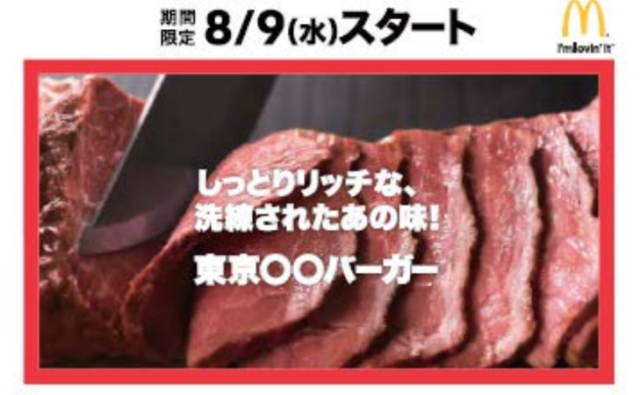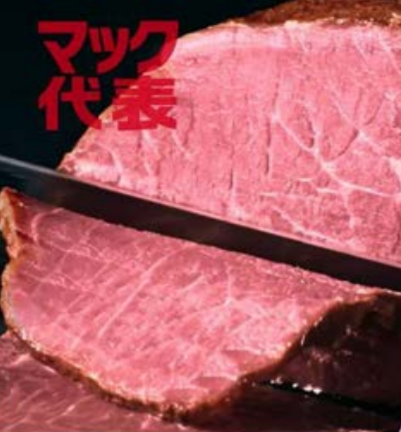
The meat in the 4.9-million Tokyo Roast Beef Burgers and Muffins McDonald’s sold wasn’t quite what people were expecting from their commercials.
Between tempting treats like the Calpis McShake and Pikachu McFlurry, plus genuine generosity such as home-delivering smiles and handing out free iced coffee, sometimes McDonald’s Japan can seem too good to be true. Unfortunately, that’s exactly what happened with a pair of menu items which have gotten the fast food chain in trouble with the Japanese government.
Last summer, McDonald’s added the Tokyo Roast Beef Burger and Tokyo Roast Beef Muffin (pictured above) to its menu, marketing the pair of sandwiches with imagery showing a carving knife slicing into thick hunks of roast beef.
However, those have been deemed deceptively delicious by the Japanese government’s Consumer Affairs Agency. Even though the visuals suggest McDonald’s chefs are working with high-class blocks of beef like you’d find at a fancy buffet the truth is that the majority of the meat (approximately 60 percent) used in the Tokyo Roast Beef Burger and Muffin was composed of separate cuts of meat that were heat-fused together then formed into the shape of roast beef slices, sort of like what happens with the company’s U.S.-available McRib.
The Consumer Affairs Agency’s report called out McDonald’s for the misleading visuals in various forms of advertising media, and was most critical of its use in a TV ad for the sandwiches, with the problematic shot seen at the one-second mark of the video below.
おや、なんだかCMのようすが😲… #東京ローストビーフバーガー オリジナル応援Tシャツを今すぐ当てよう→①公式をフォロー②この投稿をRT③結果が @Love_McD から届く 詳細は https://t.co/lxVNuQnlyo #マック軍 #マックなのかマクドなのか pic.twitter.com/H5mTHkVYj4
— マクドナルド (@McDonaldsJapan) August 9, 2017
The Tokyo Roast Beef sandwiches were limited-time items, and neither has been offered since September of last year. Nevertheless, the Consumer Affairs Agency has issued an official reprimand and administrative order against McDonald’s, saying the advertisements were in violation of Japan’s Act Against Unjustifiable Premiums and Misleading Representations (or, in less flowery terms, the country’s false advertising prohibition). While the company isn’t being ordered to make any financial restitutions to the purchasers of the 4.9 million Tokyo Roast Beef sandwiches it sold while they were on the market, it has been ordered to inform consumers that the images in its advertising suggested a level of quality significantly different from that which the product actually had, and also take measures to educate its employees about the violation and prevent future such wrongdoing.
McDonald’s maintains that while the meat used in the sandwiches was processed, that did not represent a difference in quality beyond that which it actually provided. Still, it has issued a statement saying “In the future, we will use accurate, easily understood language and imagery in our advertising,” which seems like it’d be nice on their part, since the target market for fast food generally doesn’t want to have to invest a ton of time decoding confusing commercials.
Sources: Japan Consumer Affairs Agency via IT Media, Jiji
Images: Japan Consumer Affairs Agency



 Scandal rocks McDonald’s Kanto-Kansai burger election, Tokyo Roast Beef Burger caught lying to voters
Scandal rocks McDonald’s Kanto-Kansai burger election, Tokyo Roast Beef Burger caught lying to voters McDonald’s releases new Sukiyaki Tsukimi Burger in Japan for moon viewing season 2022
McDonald’s releases new Sukiyaki Tsukimi Burger in Japan for moon viewing season 2022 We try the new 1,500-yen Kobe beef burger from Lotteria 【Taste Test】
We try the new 1,500-yen Kobe beef burger from Lotteria 【Taste Test】 “Infinite Destroyer”: The Japan-exclusive Subway sub available at only one unique branch in Tokyo
“Infinite Destroyer”: The Japan-exclusive Subway sub available at only one unique branch in Tokyo We go hunting for a fast food venison burger and are not disappointed
We go hunting for a fast food venison burger and are not disappointed Japan’s new difficult-to-drink-from beer glass protects your liver, but it’s a brutal experience
Japan’s new difficult-to-drink-from beer glass protects your liver, but it’s a brutal experience How to order snacks on a Shinkansen bullet train in Japan
How to order snacks on a Shinkansen bullet train in Japan Demon Slayer: Kimetsu no Yaiba gets new roller coaster attractions and food at Universal Studios Japan
Demon Slayer: Kimetsu no Yaiba gets new roller coaster attractions and food at Universal Studios Japan New Pokémon ice cream, dessert drinks, and cool merch coming to Baskin-Robbins Japan【Pics】
New Pokémon ice cream, dessert drinks, and cool merch coming to Baskin-Robbins Japan【Pics】 Burger King Japan suddenly adds Dr. Pepper and Dr. Pepper floats to its menu nationwide
Burger King Japan suddenly adds Dr. Pepper and Dr. Pepper floats to its menu nationwide Hello, cosmetics! Clinique teams up with Hello Kitty this summer for first-time collaboration
Hello, cosmetics! Clinique teams up with Hello Kitty this summer for first-time collaboration “The most Delicious Cup Noodle in history” – Japan’s French Cup Noodle wins our heart【Taste test】
“The most Delicious Cup Noodle in history” – Japan’s French Cup Noodle wins our heart【Taste test】 To combat declining birth rate, Japan to begin offering “Breeding Visas” to foreigners
To combat declining birth rate, Japan to begin offering “Breeding Visas” to foreigners Starbucks teams up with Japanese shochu brewery for a whole new coffee experience
Starbucks teams up with Japanese shochu brewery for a whole new coffee experience Studio Ghibli releases giant Totoro plushies in Japan
Studio Ghibli releases giant Totoro plushies in Japan Nintendo history you can feel – Super NES, N64, and GameCube controllers become capsule toys
Nintendo history you can feel – Super NES, N64, and GameCube controllers become capsule toys Starbucks releases a cute Frappuccino and Unicorn Cake…but not in Japan
Starbucks releases a cute Frappuccino and Unicorn Cake…but not in Japan Kyoto Tower mascot termination reveals dark side behind cute Japanese characters
Kyoto Tower mascot termination reveals dark side behind cute Japanese characters McDonald’s Japan’s Soft Twist Tower: A phantom ice cream only sold at select branches
McDonald’s Japan’s Soft Twist Tower: A phantom ice cream only sold at select branches Yabai Ramen: What makes this Japanese ramen so dangerous?
Yabai Ramen: What makes this Japanese ramen so dangerous? Finally! Nintendo Japan expands Switch 8-bit controller sales to everybody, Online member or not
Finally! Nintendo Japan expands Switch 8-bit controller sales to everybody, Online member or not Japanese government wants to build luxury resorts in all national parks for foreign tourists
Japanese government wants to build luxury resorts in all national parks for foreign tourists 10 things you should buy at 7-Eleven in Japan
10 things you should buy at 7-Eleven in Japan Studio Ghibli releases anime heroine cosplay dresses that are super comfy to wear
Studio Ghibli releases anime heroine cosplay dresses that are super comfy to wear Woman charged for driving suitcase without a license in Osaka
Woman charged for driving suitcase without a license in Osaka Studio Ghibli unveils My Neighbour Totoro miniature house model
Studio Ghibli unveils My Neighbour Totoro miniature house model Kyoto experiencing problems with foreign tourists not paying for bus fares, but not on purpose
Kyoto experiencing problems with foreign tourists not paying for bus fares, but not on purpose Fighting mild hunger with a Japanese soda that turns into jelly in the stomach【Taste test】
Fighting mild hunger with a Japanese soda that turns into jelly in the stomach【Taste test】 Studio Ghibli’s Howl’s Moving Castle tapestry unveiled in Japan for first time
Studio Ghibli’s Howl’s Moving Castle tapestry unveiled in Japan for first time McDonald’s new Happy Meals offer up cute and practical Sanrio lifestyle goods
McDonald’s new Happy Meals offer up cute and practical Sanrio lifestyle goods Sales of Japan’s most convenient train ticket/shopping payment cards suspended indefinitely
Sales of Japan’s most convenient train ticket/shopping payment cards suspended indefinitely Sold-out Studio Ghibli desktop humidifiers are back so Totoro can help you through the dry season
Sold-out Studio Ghibli desktop humidifiers are back so Totoro can help you through the dry season Japanese government to make first change to romanization spelling rules since the 1950s
Japanese government to make first change to romanization spelling rules since the 1950s Foreigner’s request for help in Tokyo makes us sad for the state of society
Foreigner’s request for help in Tokyo makes us sad for the state of society Ghibli founders Toshio Suzuki and Hayao Miyazaki contribute to Japanese whisky Totoro label design
Ghibli founders Toshio Suzuki and Hayao Miyazaki contribute to Japanese whisky Totoro label design Doraemon found buried at sea as scene from 1993 anime becomes real life【Photos】
Doraemon found buried at sea as scene from 1993 anime becomes real life【Photos】 Tokyo’s most famous Starbucks is closed
Tokyo’s most famous Starbucks is closed Princesses, fruits, and blacksmiths: Study reveals the 30 most unusual family names in Japan
Princesses, fruits, and blacksmiths: Study reveals the 30 most unusual family names in Japan Face-to-cheesy-face with the Marugoto Camembert Burger from Dom Dom
Face-to-cheesy-face with the Marugoto Camembert Burger from Dom Dom Godzilla burgers appear at McDonald’s Japan, and t’s time to eat them all!【Taste test】
Godzilla burgers appear at McDonald’s Japan, and t’s time to eat them all!【Taste test】 Introducing Tokyo University’s exclusive “Infinite Destroyer” sandwich from Subway
Introducing Tokyo University’s exclusive “Infinite Destroyer” sandwich from Subway 25 different Japanese convenience store sandwiches – What’s inside them?【Photos】
25 different Japanese convenience store sandwiches – What’s inside them?【Photos】 McDonald’s Japan won’t sell you a Caramel Macaron dessert burger, so we made our own
McDonald’s Japan won’t sell you a Caramel Macaron dessert burger, so we made our own McDonald’s Japan offering Calpis shakes this summer with new-and-improved recipe
McDonald’s Japan offering Calpis shakes this summer with new-and-improved recipe Burger King releases a “TOP” Burger in Japan
Burger King releases a “TOP” Burger in Japan McDonald’s Japan releases new Tsukimi “moon-viewing” burgers for 2021
McDonald’s Japan releases new Tsukimi “moon-viewing” burgers for 2021 McDonald’s and KFC Japan release new Tsukimi “moon-viewing” burgers for 2020
McDonald’s and KFC Japan release new Tsukimi “moon-viewing” burgers for 2020 We try McDonald’s Avocado Beef, see if it’s as lame as people on Twitter are suggesting
We try McDonald’s Avocado Beef, see if it’s as lame as people on Twitter are suggesting McDonald’s Japan’s Samurai Mac series: which burger is the greatest warrior of all?
McDonald’s Japan’s Samurai Mac series: which burger is the greatest warrior of all? This month’s slightly bizarre Japanese Twitter trend is showing off overly full Subway sandwiches
This month’s slightly bizarre Japanese Twitter trend is showing off overly full Subway sandwiches Mos Burger’s sauce-soaked Wet Burger sure is wet, but is it worth your burger bucks? 【Taste test】
Mos Burger’s sauce-soaked Wet Burger sure is wet, but is it worth your burger bucks? 【Taste test】 Burger King unleashes the Tokyo Teriyaki Tower in Japan
Burger King unleashes the Tokyo Teriyaki Tower in Japan Subway cuts prices for two days, helps out those watching their weight and unable to cook alike
Subway cuts prices for two days, helps out those watching their weight and unable to cook alike We try McDonald’s Japan’s new, as-yet-unnamed, Hokkaido hot potato burger
We try McDonald’s Japan’s new, as-yet-unnamed, Hokkaido hot potato burger
Leave a Reply